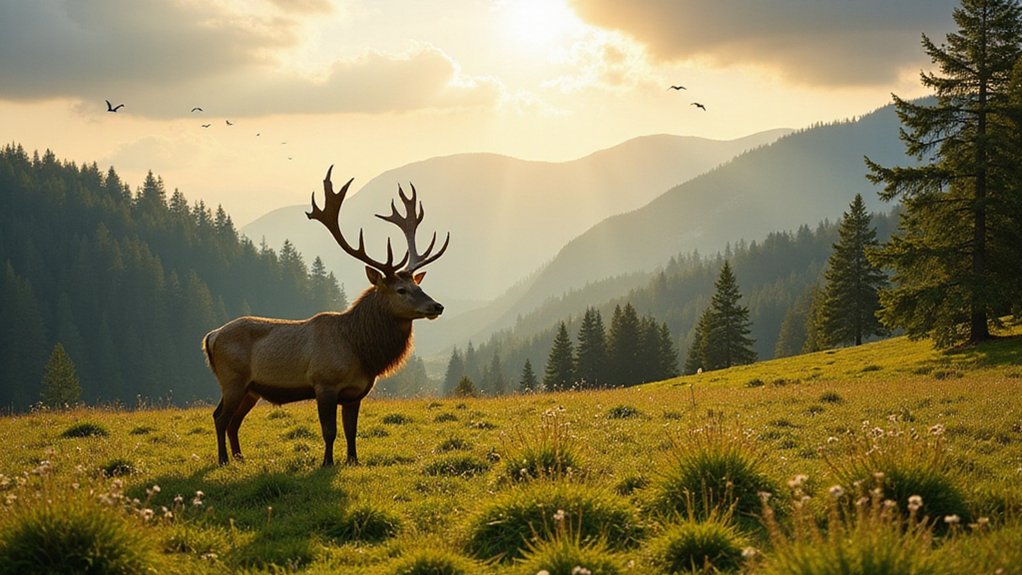You may not realize it, but hunting plays an essential role in conservation efforts. By regulating wildlife populations, it helps prevent overpopulation and habitat destruction. Hunters contribute financially through licenses and gear, which support various conservation initiatives. But how does this all tie together? What implications does it have for our ecosystems? Let’s explore the intricate relationship between hunting and conservation further.
How does hunting support conservation efforts?
While some might view hunting as merely a recreational activity, it actually plays an essential role in conservation efforts.
By participating in regulated hunting, you help manage wildlife populations, preventing overpopulation that can lead to habitat destruction. Your license fees and taxes contribute directly to conservation programs, funding habitat restoration and protection initiatives.
Furthermore, hunting can foster a sense of stewardship, encouraging you to engage with and support local ecosystems. When done responsibly, hunting promotes biodiversity and helps maintain the balance in nature, ensuring that both wildlife and their habitats thrive for future generations.
Your involvement truly makes a difference.
What are the benefits of regulated hunting for wildlife populations?
Regulated hunting offers numerous benefits for wildlife populations, primarily by maintaining healthy population levels. By carefully managing hunting practices, you help guarantee that species don’t overpopulate, which can lead to habitat degradation and increased human-wildlife conflicts.
- Controls overpopulation, preventing starvation and disease
- Enhances genetic diversity by promoting selective hunting
- Generates funding for wildlife conservation efforts
- Encourages responsible stewardship of natural resources
These factors contribute to balanced ecosystems, allowing both wildlife and human communities to thrive together.
When done responsibly, regulated hunting becomes a crucial tool in the conservation toolkit.
Why is hunting considered a tool for habitat preservation?
Hunting plays an essential role in habitat preservation by funding and supporting conservation initiatives that protect natural environments.
When you participate in hunting, you contribute to the management of wildlife populations, ensuring that ecosystems stay balanced. This balance helps maintain diverse habitats, which benefit not just game species but also countless other plants and animals.
Through hunting licenses and fees, you help provide necessary resources for land management, restoration projects, and research.
Additionally, hunting encourages landowners to maintain and enhance their properties, ensuring that crucial habitats remain intact for future generations. Your involvement directly supports a thriving ecosystem.
How does hunting funding contribute to conservation programs?
When you purchase a hunting license or gear, you’re not just preparing for a day in the field; you’re also contributing to essential conservation programs. Your funds help protect wildlife habitats and manage sustainable populations, ensuring that ecosystems thrive for future generations.
Here’s how your support makes a difference:
- Habitat restoration: Funds are used to restore and maintain natural habitats.
- Wildlife research: Financial contributions support studies on species health and behavior.
- Conservation education: Programs educate the public about ecological balance and conservation.
- Compliance enforcement: Revenues help enforce laws protecting endangered species and habitats.
What roles do hunters play in wildlife management?
While some might see hunters solely as recreational enthusiasts, they actually play an important role in wildlife management. By participating in regulated hunts, you help maintain balanced animal populations and prevent overpopulation, which can lead to habitat destruction.
Hunters also contribute valuable data on species health and behavior, aiding wildlife agencies in making informed management decisions. Your fees and licenses fund conservation initiatives, ensuring sustainable ecosystems.
Additionally, engaging in responsible hunting practices promotes awareness about habitat preservation and conservation efforts. In this way, you play a crucial part in protecting wildlife for future generations while enjoying the great outdoors.
Are there success stories of conservation through hunting initiatives?
Many successful conservation stories highlight the positive impact of hunting initiatives on wildlife populations and ecosystems.
You can see how these efforts lead to thriving species and restored habitats.
For instance:
- Namibia: Community-based conservation programs protect elephants while allowing regulated hunting.
- Montana: Elk populations are managed through hunting, ensuring ecological balance.
- Tanzania: Hunting concessions fund anti-poaching efforts, preserving diverse wildlife.
- Canada: Sustainable bear hunting contributes to the recovery of salmon streams.
These examples illustrate how hunting can be a powerful tool in conservation, fostering both wildlife populations and local communities.
How can hunting help raise awareness about environmental issues?
How does hunting connect with broader environmental issues? When you hunt, you engage directly with nature, gaining firsthand knowledge of ecosystems and wildlife. This experience often sparks conversations about habitat preservation, biodiversity, and species protection.
By participating in hunting, you become more aware of the challenges facing the environment, such as climate change and habitat loss. Additionally, hunters often support conservation initiatives through funding and advocacy, raising awareness in their communities.
As you share your experiences, you inspire others to value and protect natural resources, creating a ripple effect that emphasizes the importance of environmental stewardship for future generations.
What ethical considerations surround hunting and conservation?
As you explore the ethical considerations surrounding hunting and conservation, it’s essential to weigh the balance between wildlife management and animal welfare.
Consider the following points:
- Sustainable hunting can help control overpopulated species, preventing habitat destruction.
- Ethical hunters often support local economies and conservation funding.
- Opponents argue that killing animals for sport undermines their intrinsic value.
- The debate centers on whether it’s moral to prioritize human interests over animal rights.
